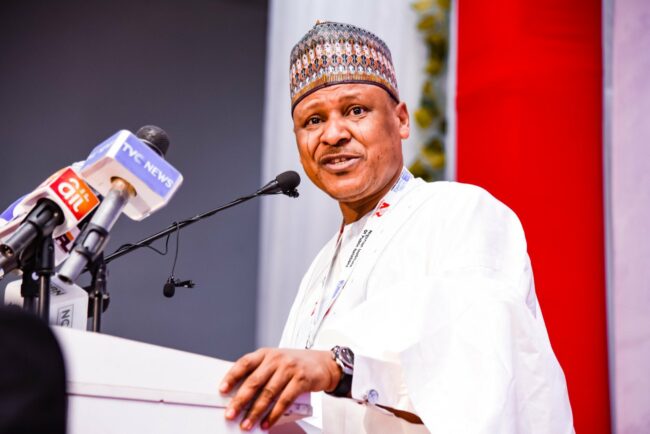Minister of Information and National Orientation, Alhaji Mohamed Idris, on Tuesday, reiterated the commitment of President Bola Tinubu’s administration to free and responsible Journalism in the country.
The Minister gave the assurance in Abuja while speaking at a two-day training workshop on “effective reporting towards strengthening alternative to Terrorist ideologies” for Security/Defence Correspondents organized by the National Counter Terrorism Center with Institute For Space And Conflict Resolution
According to him, “We sincerely appreciate your work and we will continue to support you through access to accurate information, regular media briefings, and training opportunities such as this workshop. Together, we can create a strong, united front against terrorism.
“The media holds an immense power to influence minds, shape narratives, and promote peace. In the fight against terrorism, the media can either undermine or bolster our collective efforts to provide alternatives to extremist ideologies.
“Through your reports, images, and commentaries, you have the unique ability to educate, inform, and inspire resilience among the public.”
The Minister pointed out that terrorism was not merely a physical threat, but an ideological battle of the mind with the extremist groups exploiting vulnerabilities, spreading fear, and propagating messages that presented them as fighting for a social cause, in order to further their depraved agenda.
According to him, “To counter this, we must offer compelling, positive alternatives that resonate with the same audiences targeted by terrorists. Therefore, your reporting plays a pivotal role in this endeavour.
“To achieve this, the media should continue to project successful initiatives and programmes of NCTC and ONSA that counter-radicalisation as well as the rehabilitation and reintegration of repentant terrorists”
He enjoined Defence Correspondents/Reporters to work closely with security experts, sociologists, psychologists, and community leaders to provide a multi-faceted perspective on terrorism and its alternatives and to as well use data and research to back up their stories to enhance credibility and depth.
According to him, “At all times, the media should uphold the ethics of journalism by being objective and fair and guard against sensationalism. You must also respect the dignity of victims and affected communities and void language that could be construed as biased or inflammatory.
He pointed out that sensational reporting could inadvertently glorify terrorist acts and spread fear while misinformation and fake news could be as damaging as the terrorist acts themselves, saying media must avoid this at all costs!
He urged journalists to uphold the ethics of journalism, ensuring objectivity and fairness while avoiding language that could be seen as biased or inflammatory. Idris reiterated the importance of responsible journalism in the fight against terrorism.
“Together, we can create a strong, united front against terrorism,” declared Mohammed Idris, the Minister of Information, at the launch of a two-day workshop aimed at enhancing the reporting skills of Defence Correspondents. He highlighted President Tinubu’s administration’s commitment to supporting free and responsible journalism through access to accurate information and regular training opportunities. Together, we can create a strong, united front against terrorism.”
He commended the NCTC and the Office of the National Security Adviser (ONSA), for their proactive efforts in the fight against terrorism as well as the numerous successful rescue operations of kidnap victims, which were devoted to publicity.
In his remarks, the National Security Adviser, NSA Mallam Nuhu Ribadu, said the workshop was part of efforts in response to the call of the UN Secretary General’s Plan of Action for member states to develop and implement a national communication strategy, and to ensure the dissemination of positive content across a wide range of media both traditional and digital platforms to counter terrorist appeals and violent extremist narrative.
According to him, “Information is power”, and I strongly believe this saying. The kind of information we process, and the way and manner we communicate them should be matters of great concern hence information could be functional with positive expectations or dysfunctional with consequences that are negative and life threatening; the media as conveyor belt of information can therefore influence either positively or negatively.
“The press is capable of exercising power in favour of the state or in favour of the enemies of the state. Media practitioners must always be mindful of this in the discharge of their responsibilities in order to expose societal ills and suspicious characters and activities, garnering support for the government to be able to tackle challenges.
He pointed out that terrorist groups have continued to provide dysfunctional information through social media platforms, networking sites, and online propaganda including mainstream and traditional media of communication in such a manner appealing for easy recruitment of many, especially among the youth. He added that “this is a situation that we must jointly combat to attain a safe and peaceful society that will guarantee sustainable socioeconomic development.”
He assured that the Office of the National Security Adviser (ONSA) in line with its mandate would continue to support the National Counter Terrorism Centre to collaborate with the media by prompting capacity building of the media practitioners at the national and state levels as part of the objectives of the National Counter Terrorism Strategy 2016, and the National Security Strategy 2019.
